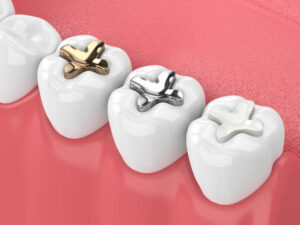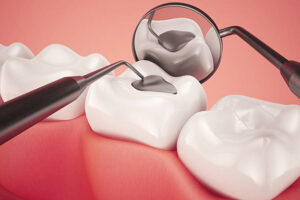

 Dental fillings are important because they can repair your teeth without having to remove or replace them completely. The problem with complete tooth replacement is that you’ll have to live with the constant reminder of your missing tooth, which can negatively impact your quality of life and self-esteem.
Dental fillings are important because they can repair your teeth without having to remove or replace them completely. The problem with complete tooth replacement is that you’ll have to live with the constant reminder of your missing tooth, which can negatively impact your quality of life and self-esteem.
Tooth decay can be a pain to deal with, but luckily, it’s easily treatable when caught early. As with many things, prevention is the best cure and getting regular dental checkups and cleanings is the best way to catch any issues before they get out of hand. Fortunately, dental fillings at Wilson House Dental Practice in Milton Keynes can provide you with the dentistry care that you need to keep your smile looking healthy and beautiful for years to come. If you have fillings in Milton Keynes that need replacing or repairing, we’re here to help at Wilson House Dental Practice. Call us today!
A dental filling is a treatment used to repair a tooth that has been damaged by decay. The decayed portion of the tooth is removed and then filled with a material to restore it to its original shape and function. There are many different types of materials that can be used for fillings, including gold, silver amalgam, composite resin, and glass ionomer. At Wilson House Dental Practice, we use the material that is best suited for each patient.
The most common symptom of a toothache is sensitivity to hot or cold foods and sugary drinks. However, a toothache can also signal sensitivity to different temperatures, as well as tooth pressure. Also, if you suddenly or persistently experience pain when chewing or biting, you may need a filling. Decay is the most common cause of oral problems such as cavities. Plaque builds up when bacteria feed on the sugars and starches left on your teeth by food or drink. Over time, a build-up of acids from foods and drinks, or with some medical conditions, like acid reflux or hiatus hernia, can corrode and weaken your tooth enamel, resulting in tiny holes. Chipping occurs when one or more of a person’s teeth break, which can expose the parts inside the tooth and lead to eventual wear and tear.
 Gold fillings, as their name suggests, are primarily made of gold and may include other metals. Most often, gold fillings consist of mostly gold with palladium, silver, or other metals.
Gold fillings, as their name suggests, are primarily made of gold and may include other metals. Most often, gold fillings consist of mostly gold with palladium, silver, or other metals.
The metals that include amalgam fillings, or silver fillings, include silver, mercury, copper, and tin. When placed in the mouth, they appear to be shiny and silver-like. The truth is they are less popular today. Although they are the most cost-effective filling for the patient, many dentists do not use them. Our team can replace such fillings, contact us today to learn more.
The composite fillings, also known as direct fillings, are made of tooth-coloured composite adhesive and applied directly to the tooth. This filling is multi-faceted with a light-sensitive component that hardens and takes shape under high-powered light. Composite fillings are commonly used to achieve a natural appearance in the teeth.
 Fillings can vary depending on the type of filling and the area being filled, but here is a typical process:
Fillings can vary depending on the type of filling and the area being filled, but here is a typical process:
The advantages of the various dental filling materials are as follows:
Gold: Gold has a pleasing appearance and lasts for at least 10 to 15 years.
Silver fillings (amalgams): The fillings last at least 10 to 15 years, and they are less expensive than composite fillings.
Tooth-coloured composite fillings: Shades can be matched to existing teeth and bond with existing teeth, resulting in additional support; frequently used for repairs other than fillings and occasionally causes less of the tooth to be removed than an amalgam would.
Ceramics/porcelain: Lasts for more than 15 years and is more stain resistant than composite resin material.
Glass ionomer: It is a special type of filling usually placed below the gum line, acrylic and certain glass materials release fluoride which can help protect from further tooth decay.
 To maintain fillings, it is essential to practice good oral hygiene: visit your dentist regularly for cleanings, brush with a toothpaste that contains fluoride, and floss and use a mouthwash with antibacterial properties at least once daily.
To maintain fillings, it is essential to practice good oral hygiene: visit your dentist regularly for cleanings, brush with a toothpaste that contains fluoride, and floss and use a mouthwash with antibacterial properties at least once daily.
If your dentist suspects that a filling might be cracked or is leaking (when the sides of the filling don’t fit tightly against the tooth, this allows debris and saliva to seep down between the filling and the tooth, which can lead to decay), they will take X-rays to assess the situation. If your tooth is experiencing heightened sensitivity, if you detect a sharp edge, if you notice any cracks in the filling, or if a piece of the filling is missing, please contact our dentist.
At Wilson House Dental Practice, we recommend that our patients come in for regular checkups. This allows us to keep an eye on your oral health and address any issues that may arise. Additionally, regular checkups allow us to provide you with preventive care and education on how to best take care of your teeth. If you have any questions or would like to schedule an appointment, please don’t hesitate to contact us.
Metal fillings normally last for about 15 years before they need to be replaced, but the length of time can vary based on different factors, such as clenching or grinding your teeth. Fillings of various colours are made from a mixture of fine glass and plastic particles.
No. Your dentist will numb the area and apply the numbing gel before injecting a local anaesthetic known as Lidocaine. During the procedure, you may feel a bit of a sensation, but that is the local anaesthetic blocking nerve signals to stop the pain.
You will need to replace fillings eventually because materials wear down by things like eating, drinking, clenching, and grinding your teeth. Damaged or old fillings may serve as entrance points for bacteria, thus causing tooth decay and potentially tooth loss. In the event a patient is unaware that their filling has degraded, they must schedule regular dental visits.
Filling some tooth cavities may require that the tooth itself be modified in shape by wedging or shaping. This can lead to a weakening of the tooth’s structure.
You should see your dentist every six months for a cleaning and check-up. However, if you have a history of cavities or gum disease, you may need to go more often. If you have any concerns about your oral health, don’t hesitate to contact us. We’re always happy to help!
Come and take a look at our treatments, if you are looking to improve your smile, click here for an appointment or by calling 01908 611478
Back to General Dentistry
All adult patients can opt to join Denplan Essentials from their very first visit. Those wanting more inclusive cover can choose Denplan Care instead. Following an assessment, your dentist will advise which group you will be able to join.
Read MoreMonday
8am – 6pm
Tuesday
8am – 6pm
Wednesday
8am – 6pm
Thursday
8am – 6pm
Friday
8am – 6pm
Saturday
Closed
Sunday
Closed